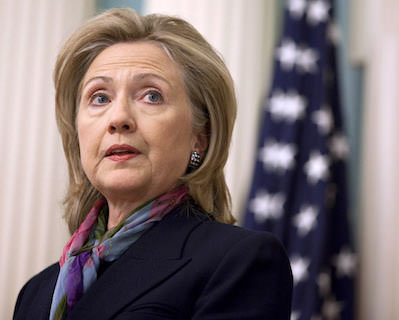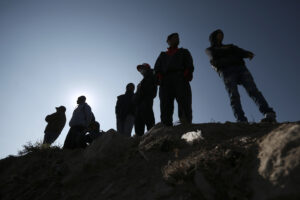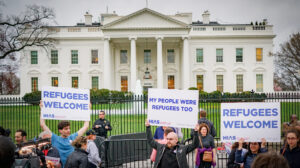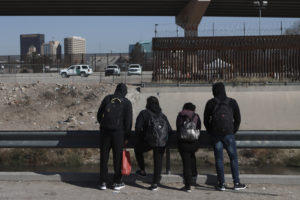WikiLeaks’ ‘Podesta Emails’ Reveal the Power Behind the Clinton Campaign
Thousands of documents have exposed the inner workings of Hillary Clinton’s team and the symbiotic relationship it shares with some members of the press.

Then-Secretary of State Hillary Clinton making a statement in 2010 on a WikiLeaks document release. (Evan Vucci / AP)
WikiLeaks released 2,000 new documents, allegedly from the email account of John Podesta, chairman of Hillary Clinton’s presidential campaign. The emails reveal some of the campaign’s inner workings and the symbiotic relationship staff members share with some members of the press.
One of the journalists now facing scrutiny over the latest trove of emails is chief Washington correspondent for CNBC and New York Times contributor John Harwood. In the emails, Harwood praises Clinton, congratulates Podesta for Clinton’s positive TV appearance, converses about Joe Biden presidential rumors, asks to meet for lunch with Podesta and attempts to set up an interview about the economy with Clinton.
In spring 2015, the campaign led an aggressive defense after allegations against Clinton and the Clinton Foundation were lodged in Peter Schweizer’s book, “Clinton Cash: The Untold Story of How and Why Foreign Governments and Businesses Helped Make Bill and Hillary Rich.”
One of the accusations explored in “Clinton Cash” and a New York Times article revolve around the approval to sell Uranium One, a uranium mining company, to Rosatom, a Russian state nuclear agency. The sale was approved by the State Department headed by Clinton, among other agencies. According to The Wall Street Journal, between 2008 and 2012, the Clinton Giustra Sustainable Growth Initiative received $2.35 million from the Fernwood Foundation, a charity run by Ian Telfer, who was chairman of Uranium One before its sale. In this same time period, former President Bill Clinton received $500,000 for a speech from a Russian investment bank, which was promoting Uranium One stock.
At the time of the revelations, Clinton press secretary Brian Fallon sent a letter to The New York Times, saying that the paper had made false allegations that went beyond “Clinton Cash.”
Fallon explained:
The bottom line is that the State Department was but one in a multitude of agencies that participated in the review of this widely supported transaction, and there is no evidence that the Department deviated in any way from its normal process involving CFIUS [Committee on Foreign Investment in the United States] reviews. In fact, as noted above, the Department’s principal representative to CFIUS at the time has confirmed that the Secretary never intervened with him in any CFIUS matter during his tenure there. Any allegations to the contrary are wholly unsubstantiated.
The representative Fallon refers to is Jose Fernandez, assistant secretary of state for economic, energy and business affairs at the time. Fernandez said that Clinton had no part in the approval of the deal, but five days before the letter was sent to The New York Times, WikiLeaks revealed that Fernandez sent an email to John Podesta titled “Helping with the Campaign.”
It was good to talk to you this afternoon, and I appreciate your taking the time to call. As I mentioned, I would like to do all I can to support Secretary Clinton, and would welcome your advice and help in steering me to the right persons in the campaign.
Below is a summary of the issues I have been working on since I left State nearly 18 months ago, and suggestions for a couple of areas where I could perhaps be of use.
WikiLeaks also alleges that Clinton’s communications director sent an email to Clinton that read, “We got a few stories placed today debunking claims in the book ahead of the NYT story, Attached is the memo cataloging the debunking stories that we are sending tonight to our friends and allies.” One of the journalists believed to be an ally is George Stephanopoulos, the chief anchor and political correspondent for ABC News, a co-anchor of “Good Morning America” and host of ABC’s “Sunday Morning This Week.”
Stephanopoulos conducted an interview with Schweizer at the time of the book’s release. After the interview, Clinton campaign spokesman Jesse Ferguson sent an email saying, “Great work everyone. This interview is perfect. He lands nothing and everything is refuted (mostly based on our work).”
Stephanopoulos was Bill Clinton’s communications director in the 1990s, and, between 2012 and 2014, he donated $75,000 dollars to the Clinton Foundation, which he failed to disclose until the foundation released a list of donors. Stephanopoulos has since apologized for not disclosing the donations.
Rather than responding to any of the content provided by WikiLeaks, the Clinton campaign has released statements about Russia and Donald Trump, making unverifiable claims that Russia is working with WikiLeaks to undermine the United States.
“It is absolutely disgraceful that the Trump campaign is cheering on a release today engineered by Vladimir Putin to interfere in this election, and this comes after Donald Trump encouraged more espionage over the summer and continued to deny the hack even happened at Sunday’s debate,” Clinton spokesman Glen Caplin said Monday.
The campaign also claims, with no evidence provided, that some of the emails could be fabricated, although WikiLeaks has no history of publishing falsified documents. Interim Democratic National Committee Chairwoman Donna Brazile—who in an interview with Stephanopoulos says she “refuses to open the documents,” because “when you see something postmarked from Russia you should be afraid to open up the documents”—faces new scrutiny after an email revealed that she notified the Clinton campaign of a Twitter strategy implemented by the Bernie Sanders campaign while she was the DNC vice chair. The DNC is meant to abide by an impartiality clause during primary elections.
Brazile was named the interim head of the DNC in July, after Debbie Wasserman Schultz was forced to resign (in the wake of an earlier WikiLeaks email release) and appears to have made a habit of tipping off the Clintons. On Tuesday, WikiLeaks released 1,190 more emails to and from Podesta, and one of them revealed that Brazile, a former CNN contributor, shared a CNN Town Hall question on the death penalty with the Clinton camp before the event. According to Mediaite, CNN denied that it has “ever given a town hall question to anyone beforehand.” But the wording in one of the town hall questions was similar to the wording of the question Brazile sent.
Brazile also released a statement: “As a longtime political activist with deep ties to our party, I supported all of our candidates for president. I often shared my thoughts with each and every campaign, and any suggestions that indicate otherwise simply are untrue. As it pertains to the CNN Debates, I never had access to questions and would never have shared them with the candidates if I did.”
The rest of her statement discussed the Russian government’s involvement in the cyberattacks, Trump’s denial that Russia is behind the hacking and WikiLeaks’ culpability in interfering with a U.S. presidential election.
The released emails reveal that this is not the first time the Clinton campaign has incited fear of Russia as an argument against critics. In June 2014, Clinton talked about “phony environmental groups” funded by Russia in a speech to tinePublic, a promotional company that hosts speeches by world leaders and celebrities.
We were up against Russia pushing oligarchs and others to buy media. We were even up against phony environmental groups, and I’m a big environmentalist, but these were funded by the Russians to stand against any effort, oh that pipeline, that fracking, that whatever will be a problem for you, and a lot of the money supporting that message was coming from Russia.
These revelations come a week after a True Pundit report claimed that Clinton wanted to drone-strike Julian Assange, editor in chief of WikiLeaks, in November 2010. The report alleges that Clinton, during a State Department meeting, said, “Can’t we just drone this guy?” The U.S. government was upset that diplomatic cables had been released by WikiLeaks and argued that the information could endanger lives.
Last week, Clinton held a news conference in Harrisburg, Pa., in which she said she couldn’t recall whether she joked about wanting to send a drone to Assange. At the time, no prosecution against Assange had occurred, and no evidence proved that WikiLeaks caused physical harm.
Assange has been living at the Ecuadorean embassy in London since August 2012, when he was granted political asylum. The United Kingdom has said that if Assange were to leave the embassy, he would be extradited to Sweden, where he is wanted for questioning over allegations of sexual assault. Assange refuses to go to Sweden in fear of then being extradited to the U.S. In February, the U.N. Working Group on Arbitrary Detention pronounced that Assange has been subject to arbitrary detention in England.
Independent journalism is under threat and overshadowed by heavily funded mainstream media.
You can help level the playing field. Become a member.
Your tax-deductible contribution keeps us digging beneath the headlines to give you thought-provoking, investigative reporting and analysis that unearths what's really happening- without compromise.
Give today to support our courageous, independent journalists.









You need to be a supporter to comment.
There are currently no responses to this article.
Be the first to respond.